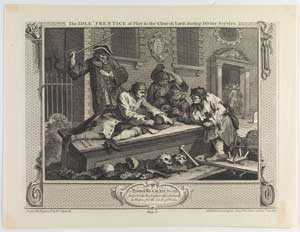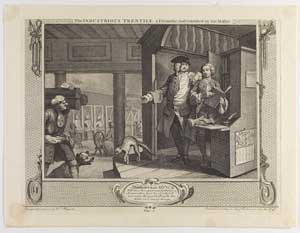The London Merchant

Anon. An excellent BALLAD of GEORGE BARNWELL
An Apprentice in the City of LONDON, who was Undone by a STRUMPET, who caused him thrice to Rob his Master, and to Murder his Uncle in Ludlow, etc. To the Tune of, The Merchant, etc. (London: 1693–4?).
This traditional ballad was first known to be published in the seventeenth century, but the text may predate that. It was meant to be sung to the tune of “The Rich Merchant Man.” An extract of it appears in the print anthology; both parts of the ballad are reproduced in their entirety here.
From The London Merchant

The London Merchant, by George Lillo, directed by Colin Blumenau. Theatre Royal, Bury St. Edmunds, Suffolk, U.K. October 1–16, 2010.
The Theatre Royal ran a series of Georgian theatrical revivals in the Restoring the Repertoire series, beginning in 2007. The Theatre Royal is the oldest working example of a Regency theatre in the UK and the series was designed to highlight plays that Georgian audiences would have seen. This website includes a production overview, an interview with the director, reviews, and cast lists.
From The London Merchant

Samuel Richardson, The Apprentice’s Vade-Mecum or, The Young Man’s Pocket Companion. Dublin: 1734, 11–23.
Richardson’s advice to apprentices in this “pocket book” (just over 2 x 5 inches) is divided into three parts. The first includes duties and responsibilities involved in the master/apprentice relationship. It also includes “occasional remarks upon the Play-houses,” primarily in the form of warning about attending with the notable exception of The London Merchant. The other two sections address the rules for apprenticeship and cautions against skepticism. The majority of the first section is included in this excerpt.
From The London Merchant

William Hogarth, Industry and Idleness, London, 1747. Courtesy the Lewis Walpole Library, Yale University.
Hogarth’s series of 12 plates about the rewards of diligence for the industrious apprentice (Francis Goodchild) and the consequences of idleness for his companion, Tom Idle. Like many of Hogarth’s “progresses,” this series charts a trajectory of narrative consequences from the main characters’ choices. The set was originally engraved to be sold for a shilling apiece, putting the set or individual prints within the financial grasp of a wide market of consumers.
From The London Merchant









